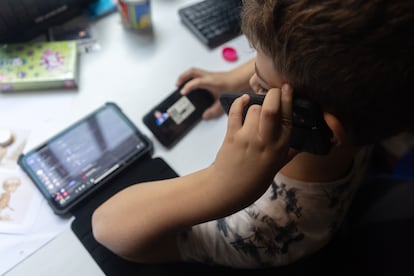Why does a 12-year-old need a cell phone?
The primary concern should not be the mobile phone itself, but rather the inadequate protection of children in digital environments

I empathize with all the parents who firmly believe that their children should wait until they turn 16 to have a cell phone. I, too, was a staunch advocate of this approach for many years. However, now that my daughters have reached the ages of 10 and 13, my perspective has evolved. While my youngest daughter still doesn’t have a cell phone, my eldest has been using one since she turned 12. Looking back, I realize that I would have allowed her to get one at least a year earlier. As for my younger daughter, I’m uncertain about the right time to give her a cell phone. Her needs and maturity differ significantly from those of her sister. Moreover, I have come to believe that age alone is not the sole determining factor when deciding to give a cell phone to a minor.
During my prohibitionist phase, my thinking was solely based on my own experience. I questioned why young children would need a cell phone when I didn’t get one until I was 20. Moreover, I believed that the potential risks associated with cell phone usage justified not buying one for them. This reasoning appeared foolproof but, as it turned out, it was not only ineffective but potentially hazardous. The first hurdle I encountered was music. I soon realized that Walkmans, CD players, mp4 players and even home stereos had vanished like the dinosaurs. Since forbidding music seemed even worse than banning technology, I reluctantly succumbed and allowed a tablet with appropriate parental controls. However, the tablet was kept in our home, so I occasionally lent my daughter my smartphone so she could listen to music, play games, take photos or message a friend. A pre-teen can find plenty to do with a cell phone in hand and my daughter gradually spent more time on devices that lacked proper content controls.
I understand that most prohibitionist parents don’t believe that their children are watching porn when they borrow their grandparents’ cell phone for a few minutes. However, one thing is certain – children are less likely to see this type of content if filters are enabled. I recently heard a story about a friend’s mother who accused her husband of watching porn because she found “porn bideos” in his cell phone’s search history. She didn’t realize that that the only person in their household who misspelled “video” as “bideo” was their eight-year-old grandson. Speaking from personal experience, I’m not sure if my daughter has searched for words like “orgasm,” “cum,” or “porn” on my phone, just as I searched a dictionary when I was her age. However, I’m certain that while any child can easily access porn on their parents’ cell phones, they can’t do the same with their parents’ bank accounts. This is because our finances are protected online, but our children are not.
In light of this, I firmly believe that the primary concern should not be the mobile phone itself, but rather the inadequate protection of children in digital environments. Social network owners and the pornography industry have the means to verify user ages, yet they often evade accountability for failing to do so. Simply prohibiting cell phone use until the age of 16 would not effectively create a safer digital landscape – our children face digital risks, regardless of cell phone ownership. Let’s focus on advocating for robust regulations to protect children, just as we safeguard financial assets. Our children are our most priceless treasures, are they not?
Sign up for our weekly newsletter to get more English-language news coverage from EL PAÍS USA Edition
Tu suscripción se está usando en otro dispositivo
¿Quieres añadir otro usuario a tu suscripción?
Si continúas leyendo en este dispositivo, no se podrá leer en el otro.
FlechaTu suscripción se está usando en otro dispositivo y solo puedes acceder a EL PAÍS desde un dispositivo a la vez.
Si quieres compartir tu cuenta, cambia tu suscripción a la modalidad Premium, así podrás añadir otro usuario. Cada uno accederá con su propia cuenta de email, lo que os permitirá personalizar vuestra experiencia en EL PAÍS.
¿Tienes una suscripción de empresa? Accede aquí para contratar más cuentas.
En el caso de no saber quién está usando tu cuenta, te recomendamos cambiar tu contraseña aquí.
Si decides continuar compartiendo tu cuenta, este mensaje se mostrará en tu dispositivo y en el de la otra persona que está usando tu cuenta de forma indefinida, afectando a tu experiencia de lectura. Puedes consultar aquí los términos y condiciones de la suscripción digital.









































